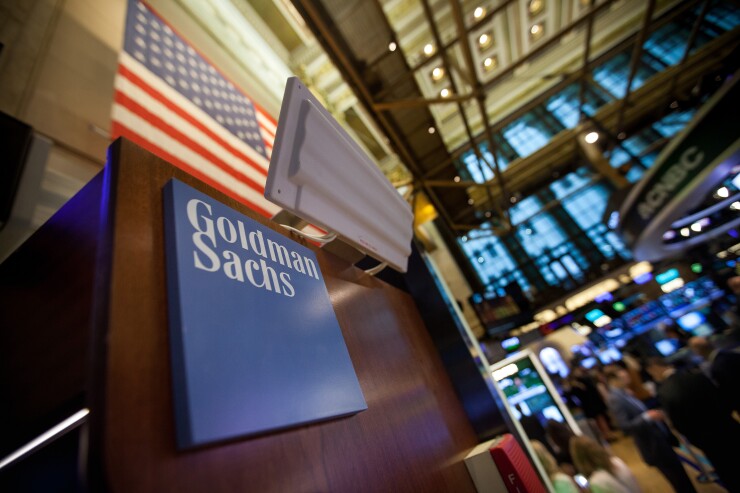
Goldman Sachs has
Sixth Street, KKR and Bayview Asset Management were part of the consortium of investors that bought Atlanta-based GreenSky for an undisclosed price, completing a deal that was initially announced last fall. The niche
GreenSky CEO Tim Kaliban said in a news release Friday that the institutional investors will bring "funding, scale and continuity" to the tech company, which also plans to deepen its long-term partnership with Synovus Financial. Sixth Street, which has more than $75 billion of assets under management, led the investor consortium and plans to help GreenSky "deepen its focus on helping grow the businesses it serves," Michael Muscolino, co-founder and partner at Sixth Street, said in the release.
"Our investor consortium looks forward to providing the GreenSky team with the resources it needs to continue innovating and delivering industry-leading and easy-to-use solutions for its merchant network and their customers," Muscolino said.
GreenSky was
GreenSky offers point-of-sale technology to connect home improvement contractors with consumers to make loans. The loans are housed through bank partners, like Synovus, which is building on its existing relationship with GreenSky.
Synovus CEO Kevin Blair said on the company's earnings call in January that he expected a "sizable increase in income"
Last month, Synovus also created a chief third-party payments officer to oversee merchant services and sponsorships, tapping Jonathan O'Connor for the role.
Since its founding in 2006, GreenSky has grown its network to more than 10,000 merchants, and has facilitated more than $50 billion of commerce through nearly 6 million consumers, the company said.
Investors drove up the stock prices of both companies after Ally Financial said it's selling its point-of-sale lending business to Synchrony Financial. The deal is expected to help Ally focus on its bread-and-butter auto lending business, while also aiding Synchrony's efforts to gain market share.
Homeowner renovation and maintenance spending peaked last year, hitting $481 billion, after growing at a rapid clip since 2020, according to Harvard's housing studies center. At the start of the home improvement heyday, banks began making moves to buy into the space.
Even last month, Synchrony Financial announced that it
While total home improvement spend has started marginally decreasing, the Harvard group still expects folks to put around $450 billion into home projects this year. Prior to 2021, that number had been hovering around $300 billion.
"Home remodeling will continue to suffer this year from a perfect storm of high prices, elevated interest rates, and weak home sales," said Carlos Martín, project director of the Remodeling Futures Program at the Joint Center for Housing Studies, in a prepared statement.
Still, Abbe Will, associate project director of the group, said in the report that recent improvements in homebuilding and mortgage rates signal that the rate of spending will pick back up by the end of 2024.






